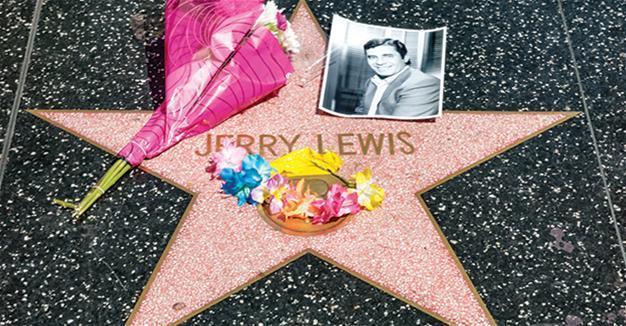The king of low-brow comedy Jerry Lewis dies aged 91
LAS VEGAS

Jerry Lewis, the high prince of low-brow comedy on stage and in film as well as a fund-raising powerhouse with his annual Labor Day telethon, died on Aug. 20 at the age of 91. Lewis died of natural causes at his home in Las Vegas.
He had been hospitalized for about five weeks beginning in early June for a urinary tract infection, keeping him from traveling to Toronto to appear in a film, his spokeswoman, Candi Cazau said.
Lewis rose to fame as the goofy foil to suave partner Dean Martin. At home, he was both loved and derided, while in France, he became a comic icon.
He once summed up his career by saying “I’ve had great success being a total idiot” and said the key was maintaining a certain child-like quality. “I look at the world through a child’s eyes because I’m 9,” he told Reuters in a November 2002 interview. “I stayed that way. I made a career out of it. It’s a wonderful place to be.”
Jim Carrey, an actor whose style owed a heavy debt to Lewis, paid tribute to the comedian soon after news of his death.
“That fool was no dummy,” Carrey wrote. “Jerry Lewis was an undeniable genius an unfathomable blessing, comedy’s absolute! I am because he was!”
Lewis was 87 when his last movie, “Max Rose,” came out in 2013, playing a jazz pianist who questions his marriage after learning his wife of 65 years may have been unfaithful.
The son of vaudeville entertainers, Lewis became a star in the early 1950s as Martin’s comic sidekick in nightclubs, on television and in 16 movies. At their height, they set off the kind of fan hysteria that once surrounded Frank Sinatra and the Beatles.
Their decade-long partnership ended with a bitter split and Lewis went on to star in his own film comedies.
He starred in more than 45 films in a career spanning five decades. His cross-eyed antics often drew scorn from critics but he was for a time a box-office hit who commanded one of the biggest salaries in Hollywood.
Long after his celebrity faded at home, Lewis was wildly popular in France, where he was hailed as “le Roi du Crazy” (the king of crazy) and inducted into the Legion of Honor, France’s highest award, in 1984. He received a similar honor in 2006.
Lewis, born Joseph Levitch on March 16, 1926, in Newark, New Jersey, started on upstate New York’s Borscht Belt comedy circuit as a singer at age 5.
In 1960, he made his movie directorial debut with “The Bellboy” and starred in the storybook parody “Cinderfella.” Three years later, he starred in his most popular movie, the self-directed “Nutty Professor,” playing a nerdy academic who makes a potion that turns him into the obnoxiously hip Buddy Love.
Lewis became closely associated with his annual Labor Day telethon to benefit children with muscular dystrophy. He first started doing telethons for the Muscular Dystrophy Association in 1952 before retiring from the job in 2011.
Cazau said that from their inception in 1966 his Labor Day telethons had raised $2.45 billion over some 45 years. Cazau also said Lewis had been planning to make onstage appearances over the next few months, in New York, and in Las Vegas next year. “He was not a quitter,” she said.
Lewis had a movie revival in 1982, winning acclaim as an arrogant talk show host kidnapped by an obsessed fan in “The King of Comedy.” He scored another late-career triumph with his 1995 Broadway debut in a revival of “Damn Yankees” and appeared in the film “Funny Bones” that same year.
“Jerry Lewis was a master. He was a giant. He was an innovator. He was a great entertainer,” said Martin Scorsese, his director in “The King of Comedy.”
Lewis was beset for years by numerous ailments, including heart attacks, an inflammatory lung disorder and chronic back pain caused by pratfalls earlier in his career.
Lewis had homes in Las Vegas and San Diego. He had six sons with singer Patti Palmer, including Gary of the rock group Gary Lewis and the Playboys. After a divorce, Lewis married SanDee Pitnick in 1983, with whom he adopted a daughter.
 Jerry Lewis, the high prince of low-brow comedy on stage and in film as well as a fund-raising powerhouse with his annual Labor Day telethon, died on Aug. 20 at the age of 91. Lewis died of natural causes at his home in Las Vegas.
Jerry Lewis, the high prince of low-brow comedy on stage and in film as well as a fund-raising powerhouse with his annual Labor Day telethon, died on Aug. 20 at the age of 91. Lewis died of natural causes at his home in Las Vegas.